24 people, 23 championships for North Carolina Women's Soccer
The Tar Heels are historically the most dominant college program in the country and have a long line of game changers.
When the University of North Carolina claimed their 23rd Women's Soccer National Championship title against Wake Forest in December, it made them the winners of 52% of NCAA College Cups. In honor of their historic championship, we’re highlighting 24 key figures from each national title from 1981 until 2024.
1981: Anson Dorrance
Anson Dorrance captured his first title, the last national championship under the Association for Intercollegiate Women’s Athletics. Dorrance would spend the next four decades building arguably the strongest program in any NCAA sport. After 47 seasons at the helm of a dominant program, Dorrance retired during the 2024 preseason.
1982: Synthia Scott Kearney
Synthia Scott worked her way up from UNC club soccer to a spot on the varsity team. Not only had she not played soccer before attending UNC, but she was also the first black female soccer player in UNC’s history. She was one of the leading scorers of the NCAA’s first women’s soccer tournament and bagged a winner in the tournament semifinal to send the Tar Heels through. After UNC, Kearney joined the U.S. Secret Service before serving as a Bureau of Alcohol, Firearms and Tobacco agent and then became a firefighter. She rose to the rank of battalion chief, also becoming the first woman in her fire department’s history to do so.
1983: Suzanne Cobb Germain
In a tournament that saw attacking studs Amy Machin and April Heinrichs get nine combined goals in eight games, Suzanne Cobb was named tournament MVP. Only losing one game all year, Cobb’s steadiness at the back stood out in a way defenders are rarely able to. Cobb’s time leading the defense saw four titles in four years, easily earning her induction into the Virginia-DC Soccer Hall of Fame.
1984: Amy Machin
Amy Machin helped lead the attacking line in 1984 after leading the team in goals the previous two seasons. The Tar Heels won 24 of 25 possible games, only drawing with George Mason University 1-1. Machin was awarded the Offensive Most Outstanding Player award despite not banging in a volume of goals like her counterparts.
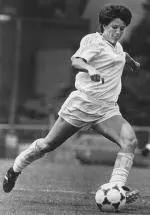
1986: April Heinrichs
Heinrichs was tasked with ending her college career on a high note. The Tar Heels again won 24 of 25 possible games, only drawing with Central Florida 1-1. Heinrichs won her second Most Outstanding Player award for scoring an overtime winner in the semifinals, scoring again in the finals, and leading the tournament in points. Heinrichs left UNC a champion and remains in the top three for points and goals in UNC history to this day. The Tar Heels would not lose a match for the remainder of the 80s.
1987: Anne Sherow
Goalkeeper Anne Sherow let in one goal the entire 1987 season. The sole stain on 1700 minutes of impeccable goalkeeping came against a strong George Mason team in a 4-1 victory. Sherow set an NCAA record 23 shutouts, adding up to a .05 scoring average for opponents. In a team so dominant, consistent goalkeeping can be taken for granted.
1988: Carla Werden Overbeck
Carla Werden was named the 1988 Most Outstanding Defensive Player after helping Sherow and the staunch Carolina backline dominate in ‘87. Werden was a four-year mainstay, never losing a game in a UNC uniform.
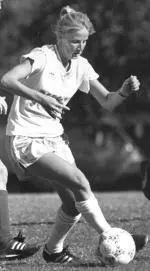
1989: Shannon Higgins
Higgins would lead the 1988 and 1989 NCAA tournaments in offense en route to a 1988 Most Outstanding Offensive Player award. She would win more awards in 1989, the Honda Award, the Hermann Trophy, and the ACC Athlete of the Year to complement her 48 points on the season. Higgins was present and prominent in all four years of UNC’s undefeated dominance, holding the midfield together in a dynastic core.
1990: Kristine Lilly
The 1990 season saw UNC lose for the first time in 103 games at UConn. Freshmen Kristine Lilly and Mia Hamm led the way with 20 goals each. Lilly would take her sophomore season by the horns, bagging two equalizers in a stunning 4-3 match with NC State in the second round of the tournament before scoring again in the semifinal. Lilly was awarded Most Outstanding Offensive Player as the Tar Heels smashed six goals past UConn in the final.
1991: Pam Kalinoski
Pam Kalinoski had not played much for UNC. She was recovering from a serious knee injury and sat behind the rampaging underclassmen. However, when the US National Team came calling for Lilly, Mia Hamm, and Coach Anson Dorrance, UNC needed leadership and scoring opportunities ASAP. Kalinoski came in and provided more than enough, bagging a record-breaking 28 assists in the regular season, and winning the tournament’s Most Outstanding Offensive Player.
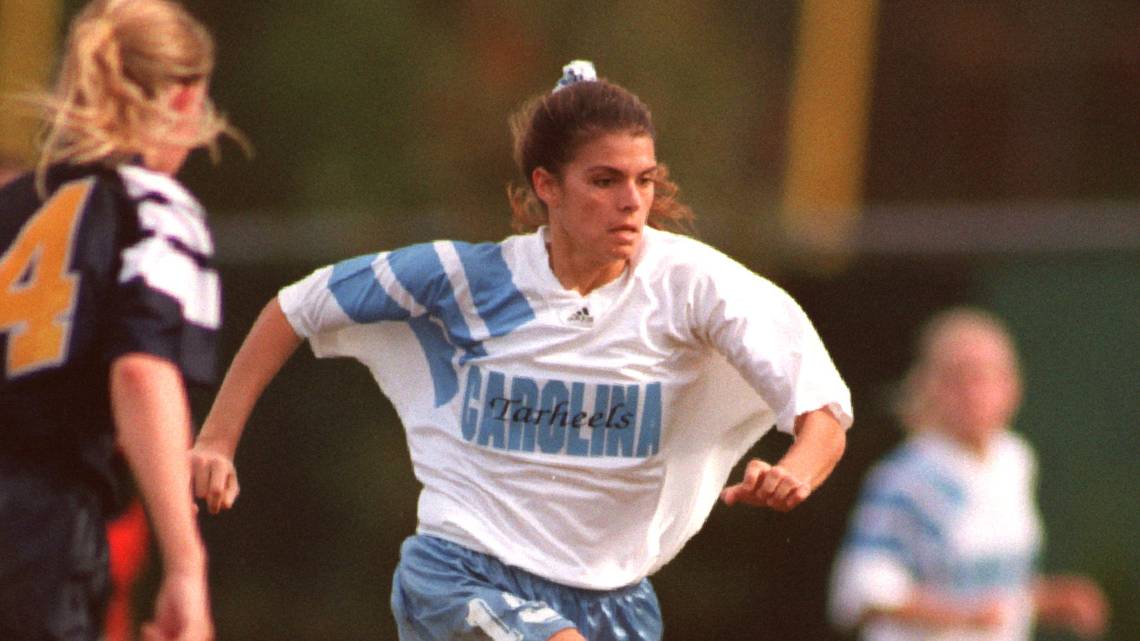
1992: Mia Hamm
After redshirting the previous season for the World Cup, Mia Hamm came into 1992 ready to dominate the competition. She would hang 32 goals and 33 assists on her competition, holding the record at UNC for assists in a single season. The Tar Heels went 25-0, blowing out Duke 9-1 in the title game after conceding a goal early. Hamm won both ACC and National Player of the Year, as well as tournament MVP. Hamm would dominate again in 1993, winning another Tournament Most Outstanding Offensive Player and ending her career as arguably the greatest soccer player in American history.
1993: Angela Kelly
The Tar Heels would waltz to another undefeated season in 1993, as the champions returned all of their major contributors, including midfielder Angela Kelly. A metronome during her time in Chapel Hill, Kelly previously held the NCAA record for appearance and starts. UNC would score multiple goals in every single matchup for the second year in a row. Kelly made the all-tournament team and would bag a winner in the following year’s final. Since retiring as a player, Kelly has been coaching, first at Tennessee and then at Texas, where she remains to this day.
1994: Tisha Venturini
Venturini stormed back from a foot injury in 1993 to win tournament MVP honors that year. 1994 would be even stronger for Venturini, who bounced back from the first loss of her career to dominate the awards voting at season's end. She scored the first hat trick in ACC tournament history and won the tournament's Most Outstanding Offensive Player.
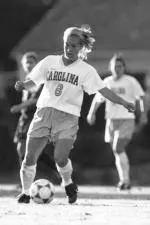
1996: Debbie Keller
1996 was a season of firsts, as UNC had their first title challenge in almost a decade and lost to the same team twice, Notre Dame, for the first time in school history. It also was Debbie Keller’s shining moment. In the second half of overtime, Keller struck a blow to avenge the back-to-back defeats earlier in the season. Such a stunning goal earned her the Tournament’s Most Outstanding Offensive Player and brought UNC back to the top of the mountain.
1997: Robin Confer
The Tar Heels were undefeated again in 1997, allowing just eight goals in over the course of 28 games. The Heels collective unit matched their record of 22 shutouts in a single season. Co-National Player of the Year Robin Confer helped push the squad, scoring the winning goal in the final and ultimately earning the tournament's Most Outstanding Offensive Player.
1999: Lorrie Fair Allen
Defense was a hallmark of the 1999 Tar Heels, who conceded only one goal over their final 13 games. Lorrie Fair led this defense while winning National Player of the Year and Tournament Most Outstanding Defensive Player. The only collegiate athlete to play on the 1999 World Cup Squad, Fair was consistently able to contribute goals and assists while still taking care of defensive business.
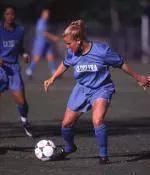
2000: Meredith Florance
2000 was a comparatively bad year for UNC, finishing 18-3 but still claimed the national title. A huge key to the title defense was Meredith Florance, who led the Tar Heels with 26 goals, including five game winners over the course of the season. She scored the most important goal of her senior season in the final, equalizing against UCLA with less than 20 minutes remaining. UNC would score another and secure the title once again.
2003: Lindsay Tarpley
After a few years below the mountaintop, UNC’s 2003 group came out and completely dominated. The most impressive season since Mia Hamm and Co. graced Chapel Hill, the 27-0-0 was led by a transformative Lindsay Tarpley. With 50 goal contributions in 27 games, 11 assists in the NCAA tournament, and a spot on the all-tournament team, 2003 is about as good as it gets for a team.
2006: Heather O’Reilly
The Heels got it together after two years without silverware and again went undefeated to the tune of 27-0-1. Star senior Heather O’Reilly contributed 12 goals and 16 assists over the course of a turnaround season. In the final, UCLA held the Tar Heels to a 0-0 draw until the last 10 minutes. One goal came to put them ahead, then O’Reilly scored the final goal and put the championship to bed.
2008: Casey Nogueira
UNC faced down old rivals, Notre Dame, in the 2008 title game, with hopes to reassert themselves at the top of the mountain. Nogueira paced the team with 25 goals and eight assists on the season en route to the Honda Sports Award for the best soccer player in the nation. Nogueira scored two goals that stunned Notre Dame to take the championship back to Chapel Hill.
2009: Whitney Engen
Whitney Engen played and started all 27 games for the Tar Heels in 2009. She had transitioned from attack to defense the previous year, leading the team in minutes as a central defender. The combination of grit and on ball quality made her and UNC difficult to deal with all season, leading to her winning the most Outstanding Defensive Player for the tournament, as well as the Honda Sports Award for the best soccer player in the nation. UNC bested Stanford 1-0 in the final to claim another championship.
2012: Satara Murray
This year is the first in UNC’s championship seasons that’s truly tumultuous, earning a 15-5-3 record during regular season play. Satara Murray was the Most Outstanding Defensive Player, as the Tar Heels made a balanced run to the College Cup. Murray would go on to have a storied professional career and is currently the captain of Sheffield United.
2024: Damon Nahas/Kate Faasse
As UNC experienced an exodus in talent to the NWSL and transfer portal, and Anson Dorrance retired days before the season began, the responsibility fell on the interim head coach and the captain. Nahas hit the ground running, building a strong system and getting crucial buy-in for the post-Dorrance era. Kate Faasse did her part, scoring 20 goals on the season including a crucial header(shoulder) goal to send UNC to the College Cup. Nahas has been stripped of his interim title and has likely received a new contract since the title win, while Faase is an extremely strong candidate for the MAC Hermann award. In a season as rare and tumultuous as this, it takes more than an individual to guide a group to greatness.
